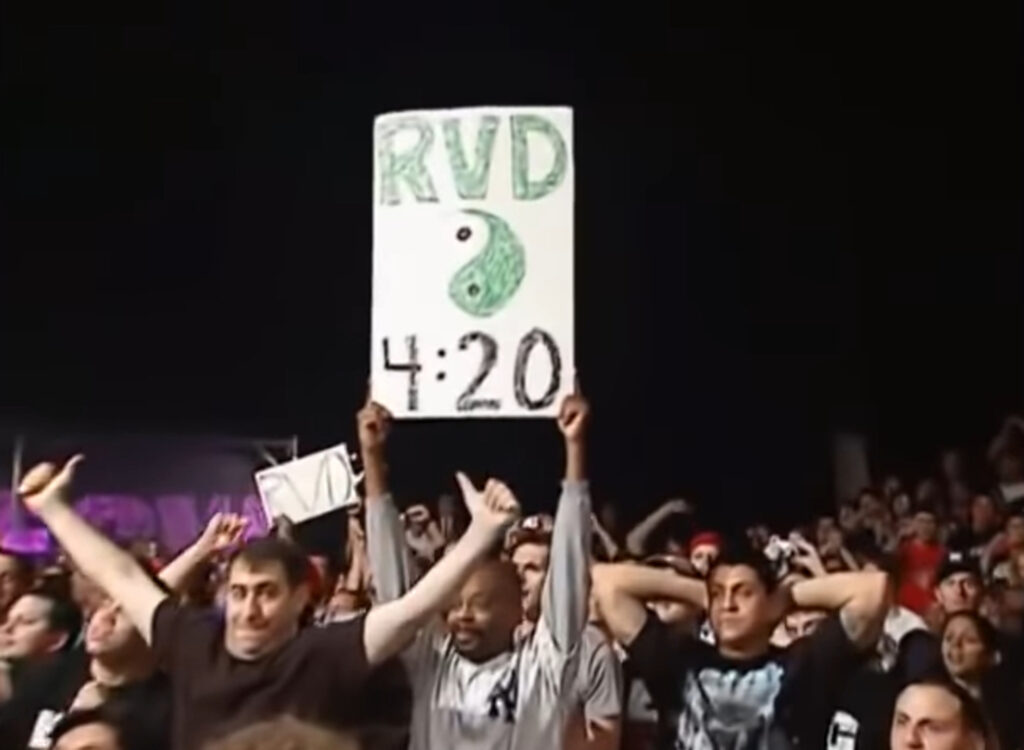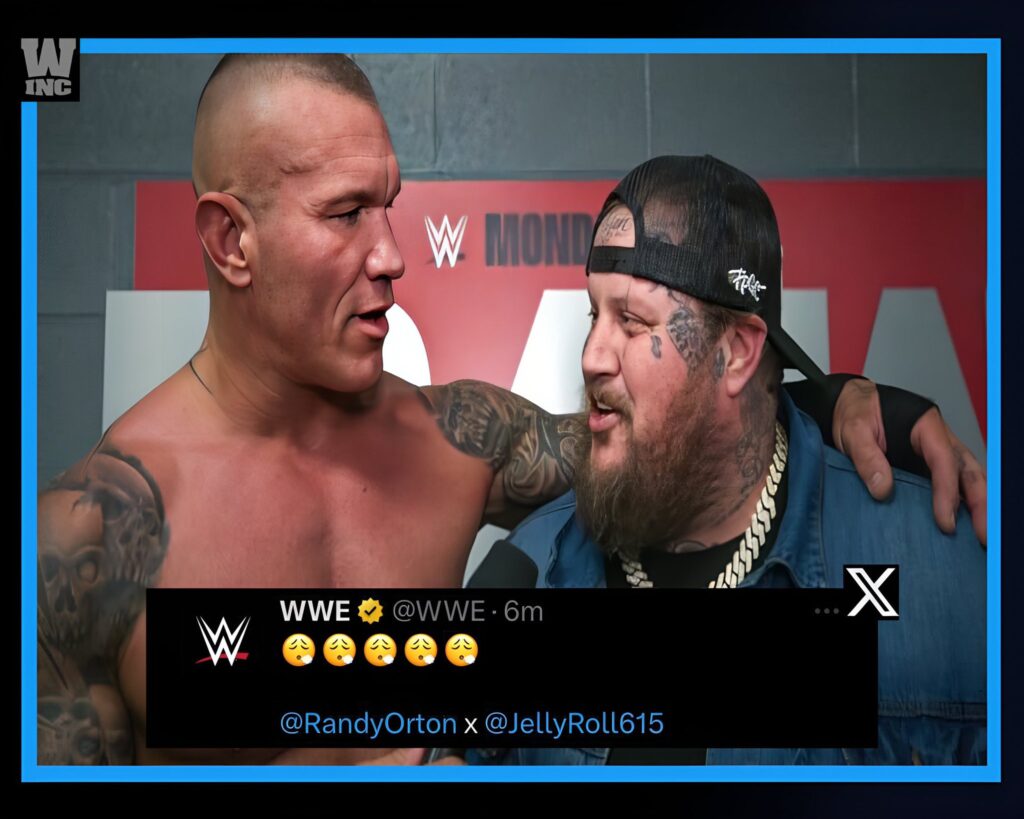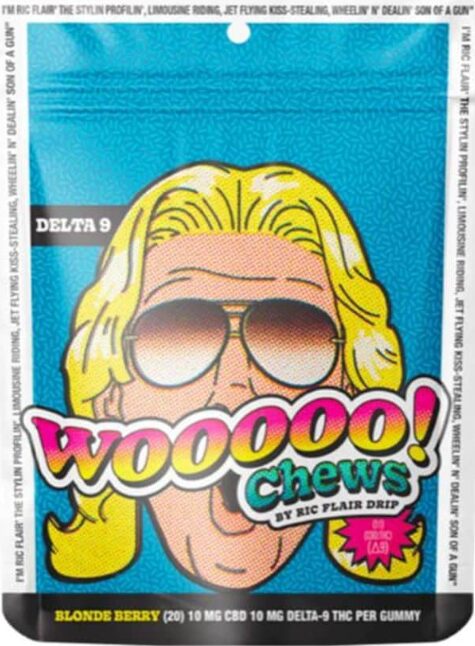420, the cannabis community’s high holy day, is just around the corner. Every April, the community gathers worldwide to celebrate and enjoy some herb. Professional athletics represent one of the most powerful components to normalizing the plant. In recent years, incremental yet monumental steps were taken across many American sports.
Almost five years ago, the PGA got involved, with top stars like Bubba Watson announcing CBD partnerships. A few years later, in 2022, Major League Baseball inked a deal with Charlotte’s Web, solidifying the company as MLB’s official CBD brand. The move follows a similar measure with the Big3 in 2021. The NBA took a significant step forward with THC in 2023, removing cannabis from its banned substance list while also allowing active players to invest in pot companies.
The scripted world of professional wrestling hasn’t taken as many clear-cut steps. Still, many top promotions and their stars have shown subtle or outright support for cannabis, the community, and its business potential.
Pro Wrestling and Weed: Earlier Decades
Like most facets of life, pro wrestling has had a long, storied, and often under-the-radar historical connection to cannabis. Numerous wrestlers have consumed cannabis over the years, with the trend beginning decades ago, likely due to rigorous touring schedules and the physically demanding work associated with wrestling on 250-plus shows a year.
Documentation of wrestler lifestyles suggests that pot use and pro wrestling became significantly linked decades ago, with the 1980s marking an exceptionally high period of pot and other drug use. Experiences during the ‘80s and ‘90s were rarely seen on-screen, maintaining the appearance of kayfabe, or the scripted reality of wrestling. While the 1987 drug weed and cocaine bust featuring carpool buddies and on-screen rivals “Hacksaw” Jim Duggan and The Iron Sheik harmed wrestling’s authenticity in the public eye, weed was not integrated into the storylines then or for many years after.
Pot use would remain a regular option for performers until the early 90s when then-WWF/WWE owner Vince McMahon found himself on the metaphorical ropes with a federal steroid case looming overhead. In response, WWF banned marijuana and instituted stricter testing protocols. One of the most vocal opponents of the change was Bret “The Hitman” Hart, arguing the ban would push performers to engage in less restricted, more dangerous substances, such as alcohol and prescription pills. Tragically, Hart was proven correct over the following decades, as deaths caused by or attributed to drug use spiked across the industry.
Despite the ban, numerous performers contracted to the WWF and other promotions often continued to consume. Notable names included on-screen talent like The Godfather and 2 Cold Scorpio. In 2019, former President of World Championship Wrestling Eric Bischoff said he’d never met anyone who smoked more weed than the long-running high flier Scorpio.
Pro Wrestling and Weed: A Shifting Landscape

Sentiments began to change in the late ‘90s, particularly in 1997, when Rob Van Dam (RVD) took his growing reputation as a pot consumer into the ring at ECW live shows and tapings. After spotting an “RVD 420” sign in the audience, he was ready to champion the plant publicly. The success of RVD likely helped bring The Godfather’s years of behind-the-scenes consumption onto the big screen in 1998. After several years floating between gimmicks, the Godfather found success in the “Attitude Era” as a pimp who often encouraged crowds to “Roll up a fatty for this pimp daddy.”
Meanwhile, RVD’s success in the ring and as a pot advocate led to a High Times cover story in 1999. The magazine’s main image also featured fellow ECW wrestler Sabu, who, along with Van Dam, was busted for cannabis and other drugs during a 2007 roadside police stop while working for WWE. Both would be arrested, leading to RVD dropping both the WWE and ECW titles the following week and being suspended for 30 days. Other wrestlers, including former WWE tag team champion Paul London, have also reported that getting caught smoking pot during the same period led to him and then-partner Brian Kendrick dropping their titles.
Despite the consequences, many performers continued to use pot through the ‘90s and early 2000s. Referee Mike Chioda has gone on record detailing performer use during the era, noting memorable smoke sessions with former ref turned Smackdown’s long-running on-screen General Manager Teddy Long. Long recently shared an experience smoking with Snoop Dogg and other influential wrestling figures, including Randy Orton and the late Umaga.
Despite the arrest, Van Dam continues to consume and advocate for the plant, a cause he champions in and out of the ring. Though he is often regarded as pro wrestling’s top pot personality, The Godfather has claimed to consume more.
Pot and Pro Wrestling Today
Wrestling continues to embrace pot incrementally. While WWE, AEW, and other leading promotions haven’t inked CBD brand sponsorships, references are finding their way on-screen increasingly. RVD remains a fixture in the scripted sport, with regular appearances in AEW, TNA, and independent shows.
The most pot-forward wrestler of the modern era is arguably Matt Riddle, whose open embrace of pot helped propel his “bro” gimmick. However, after a 2023 release from WWE, Riddle has downplayed cannabis use when making appearances for New Japan Pro Wrestling, with the country’s approach to cannabis likely driving the creative decision. Riddle’s short-lived tag team partner, Randy Orton, has played a pivotal role in behind-the-scenes and on-screen pot support. Numerous reports identified Orton for helping convince WWE to change its pot testing policy, doing away with fines and other possible punishments for positive cannabis tests.

In November 2023, Orton returned to WWE TV after a lengthy injury layoff. On his first night back to WWE’s Monday Night Raw live show, “The Viper” was seen dapping up musician Jelly Roll, with Orton playfully noting a familiar smell in the air. This marked the company’s second subtle pot shoutout in recent months. The first came earlier that year, when “The Tribal Chief” Roman Reigns, who reportedly has used cannabis during cancer treatments, playfully called a fan out for a similar smell and their red eyes.
Legalization and stigmas will likely keep the on-screen references to more subtle shouts for the time being. However, the incremental progress on-screen is echoed in the independent scene, where characters are often bolder without the risk of upsetting advertisers and family audiences. Pot-friendly characters have emerged nationwide in recent years, highlighted by veteran performers, including Grim Reefer and The Stoner Brothers.
At the same time, wrestlers are entering the weed and cannabinoid business worlds. The Godfather is a regular pitch man and guest at industry events. RVD has rolled out CBD and THC products over the years. Riddle followed suit in 2023. However, the most notable name to enter the THC market may be Ric Flair, with “The Nature Boy” rolling out his Ric Flair Drip strain in 2022, capitalizing on the success of the track popularized by 21 Savage, Offset and Metro Boomin.
Others have also gotten into the space, with legendary announcer Jim Ross planning an Oklahoma brand that is rumored to be out soon, if not already. Meanwhile, Mercedes Mone and Samuray del Sol (Sasha Banks (known as Kalisto in WWE) launched the CBD line Kanndela, picking up an Industry Newcomer Award at the World CBD Awards in 2022. And in 2023, wrestling’s most famous figure of the past several decades, Hulk Hogan, linked up with the producers behind Ric Flair Drip to launch a line of products made from Delta 8 THC, CBD, and kratom.
While other major sports have gone further with their public pot embrace, pro wrestling represents an ongoing evolution in plant acceptance. In doing so, performers are living healthier lives, with talent no longer frequently passing away from substance abuse issues at young ages. What type of representation we’ll see on-screen remains to be seen. But as it currently stands, the world of pro wrestling has heard the message about weed and other cannabinoids, providing performers with healthier post-show alternatives while further destigmatizing cannabis to its audience.







